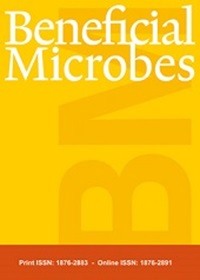食物基质对菊粉型果聚糖益生元功效的影响:一项随机试验
IF 3
4区 医学
Q2 MICROBIOLOGY
引用次数: 0
摘要
摘要近年来,关于食物基质对菊糖型果聚糖益生元功效的影响,科学界争论颇多。先前的研究表明,菊粉型果聚糖对双歧杆菌的益生元选择性不受食物基质的影响。由于研究设计的差异,不能从这些发现中得出任何程度的确定性的明确结论。在这项随机试验中,我们的目的是确定不同的食物基质对菊粉型果聚糖的益生元功效的影响,遵循一个标准化的10天,四臂,平行,随机方案,将菊粉纯形式或加入酥饼饼干,牛奶巧克力或米饮料中。在使用荧光原位杂交的所有四种干预措施中,双歧杆菌计数均有类似的增加(纯菊粉:0.63;酥饼:0.59;牛奶巧克力:0.65和米饮料:0.71 (log 10 cells/g湿粪便)和16S rRNA测序定量微生物组分析数据(纯菊粉:1.21 × 10 9;酥饼:1.47 × 10 9;牛奶巧克力:8.59 × 10 8,米饮料:1.04 × 10 9(细胞/克湿粪便)(全部)。从这些结果中,我们可以证实,无论食物基质如何,菊粉型果聚糖对双歧杆菌的选择性都不受影响,但食物基质的组成构成可能对微生物群的更广泛变化有影响。本文章由计算机程序翻译,如有差异,请以英文原文为准。
Effects of food matrix on the prebiotic efficacy of inulin-type fructans: a randomised trial
Abstract Recently there is much debate in the scientific community over the impact of the food matrix on prebiotic efficacy of inulin-type fructans. Previous studies suggest that prebiotic selectivity of inulin-type fructans towards bifidobacteria is unaffected by the food matrix. Due to differences in study design, definitive conclusions cannot be drawn from these findings with any degree of certainty. In this randomised trial, we aimed to determine the effects that different food matrices had on the prebiotic efficacy of inulin-type fructans following a standardised 10-day, 4-arm, parallel, randomised protocol with inulin either in pure form or incorporated into shortbread biscuits, milk chocolate or a rice drink. Similar increases in Bifidobacterium counts were documented across all four interventions using both fluorescence in situ hybridisation (pure inulin: 0.63; shortbread: 0.59; milk chocolate: 0.65 and rice drink: 0.71 (log 10 cells/g wet faeces) and 16S rRNA sequencing quantitative microbiome profiling data (pure inulin: 1.21 × 10 9 ; shortbread: 1.47 × 10 9 ; milk chocolate: 8.59 × 10 8 and rice drink: 1.04 × 10 9 (cells/g wet faeces) (all ). From these results, we can confirm that irrespective of the food matrix, the selectivity of inulin-type fructans towards Bifidobacterium is unaffected, yet the compositional make-up of the food matrix may have implications regarding wider changes in the microbiota.
求助全文
通过发布文献求助,成功后即可免费获取论文全文。
去求助
来源期刊

Beneficial microbes
MICROBIOLOGY-NUTRITION & DIETETICS
CiteScore
7.90
自引率
1.90%
发文量
53
审稿时长
>12 weeks
期刊介绍:
Beneficial Microbes is a peer-reviewed scientific journal with a specific area of focus: the promotion of the science of microbes beneficial to the health and wellbeing of man and animal. The journal contains original research papers and critical reviews in all areas dealing with beneficial microbes in both the small and large intestine, together with opinions, a calendar of forthcoming beneficial microbes-related events and book reviews. The journal takes a multidisciplinary approach and focuses on a broad spectrum of issues, including safety aspects of pro- & prebiotics, regulatory aspects, mechanisms of action, health benefits for the host, optimal production processes, screening methods, (meta)genomics, proteomics and metabolomics, host and bacterial physiology, application, and role in health and disease in man and animal. Beneficial Microbes is intended to serve the needs of researchers and professionals from the scientific community and industry, as well as those of policy makers and regulators.
The journal will have five major sections:
* Food, nutrition and health
* Animal nutrition
* Processing and application
* Regulatory & safety aspects
* Medical & health applications
In these sections, topics dealt with by Beneficial Microbes include:
* Worldwide safety and regulatory issues
* Human and animal nutrition and health effects
* Latest discoveries in mechanistic studies and screening methods to unravel mode of action
* Host physiology related to allergy, inflammation, obesity, etc.
* Trends in application of (meta)genomics, proteomics and metabolomics
* New developments in how processing optimizes pro- & prebiotics for application
* Bacterial physiology related to health benefits
 求助内容:
求助内容: 应助结果提醒方式:
应助结果提醒方式:


